“I never became a daroga, but I am doing my bit to keep people safe”
Rakesh Kumar Valmiki, a sanitation worker, wanted to be a daroga (policeman) and protect his fellow citizens, but he became a safai karamchari instead, and, in the pandemic, has kept them safe from disease.
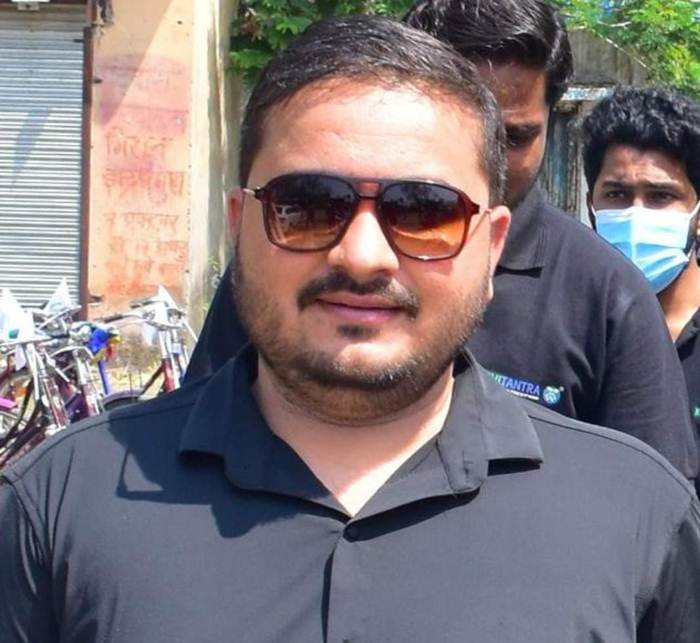
Sitapur, Uttar Pradesh
Rakesh Kumar Valmiki’s childhood dream was to become a daroga (policeman). But, that stayed a dream. The 38-year-old sanitation worker from Maholi municipality in Sitapur district, said he looked to his children to fulfil that dream.
Rakesh Kumar is a Dalit, officially categorised as a member of the ‘schedule caste’. The community has traditionally been associated with sanitation work, including manual scavenging. According to the 2011 census, there are 326,000 Valmiki community households in Uttar Pradesh of which 219,000 households are in its rural areas.
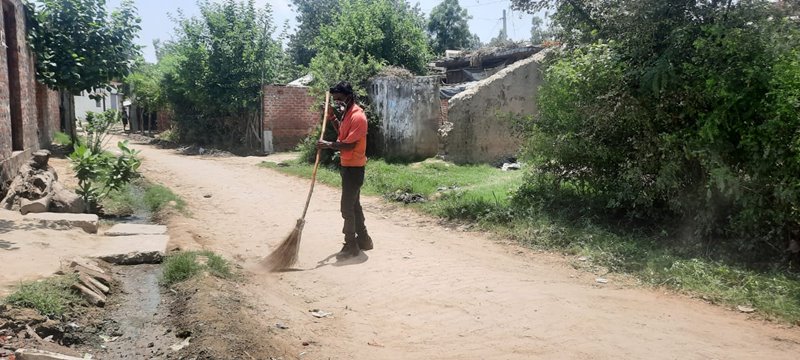
Rakesh Kumar’s family is one of them.
Even when the pandemic was at its peak, Rakesh Kumar set out to work every day, a broom in one hand and a spade in the other. “It is a tough job. People clean out their homes and dump the garbage into the drains that get clogged. I have to unclog them at least once a week,” Kumar told Gaon Connection.
If the drains are not cleaned, there is always the danger of mosquitoes breeding in the stagnant drain water, he pointed out. “I was worried about getting COVID, but I still continued to work,” he added.
Rakesh Kumar gets a salary of Rs 28,000 a month with which he supports his wife and six children ranging between three and twelve years of age. He is the sole breadwinner of the family.
Also Read: Affront to dignity: Dalit women still carry human excreta for wheat, roti and pickles in UP
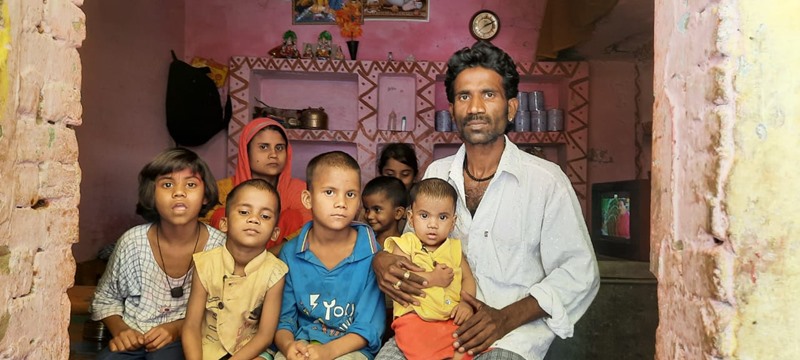
Daroga dream disappears
While there is no official statistics on the number of Valmiki children getting an education, it is no secret that most of them drop out much before they reach middle school. Something similar happened with Kumar.
“I passed my eighth standard, but had to discontinue my studies as my family could not afford it and needed a pair of hands to earn for the family. So when in 2008 the government had a recruitment drive for safai karamcharis, I applied and was selected,” he told Gaon Connection.
Also Read: A life less equal: At least 340 manual scavengers dead in the past 5 years
Ever since, Rakesh Kumar has been on the job. His day begins at 5:30 am. He gets ready, and by 8 am he is at work carrying along the lunch his wife has packed for him. His area of operation includes the three villages of Kachura, Ram Bilas Purwa and Bhudia.
Rakesh Kumar wears an ordinary mask, has no PPE kit and not even gloves. “The gram pradhan of Kachura village, Kusum Bajpai, provided me with hand sanitiser but I have not got anything else. I have no protective gear against the virus,” he said.
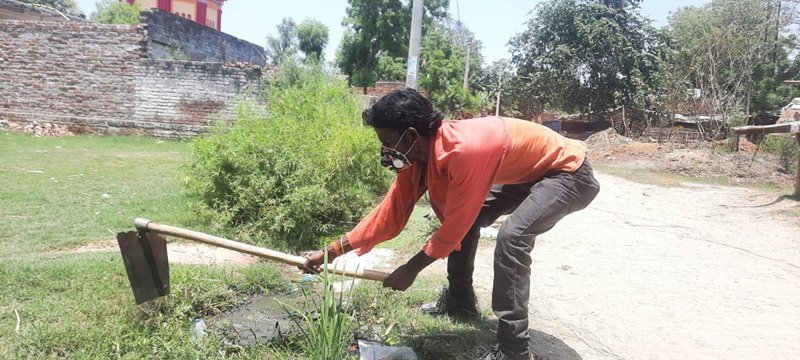
“I work for nearly eight to ten hours a day. I first clean the surroundings of the village school. I am the only safai karamchari for a population of nearly five thousand people,” said Rakesh Kumar who is responsible for the cleaning and sanitation of the area.
“There are days I cannot manage by myself and I get tired. On those days, I get others to do some work too and pay them,” he said.
Also Read: Give us work for wages, demand former manual scavengers in UP’s Jalaun
Keeping it clean
Despite the daily challenges, more so in the pandemic, Kumar said with pride that ever since safai karamcharis — officially termed as safai nayaks — were employed, the public spaces in villages are spruced up and the drains do not overflow into the streets.
Rakesh Kumar regularly sprays and sanitises the surrounding areas, and rightly feels he too is contributing to the protection of the people in the COVID-19 pandemic.
“Children play out on the streets, there is a pandemic on… I feel it is my responsibility to keep the surroundings clean,” said the safai karamchari.
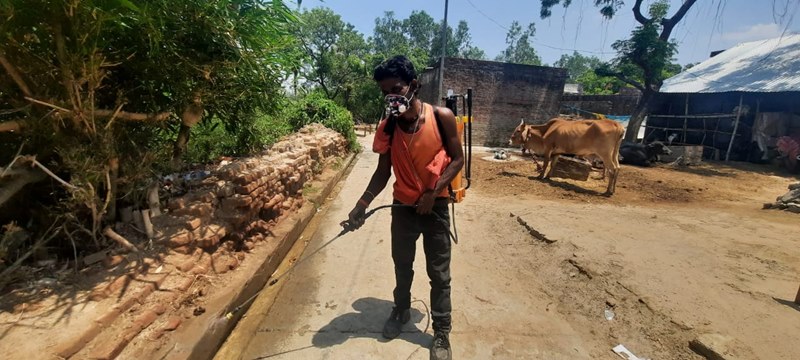
“It is true. With everything shut down, had the safai karmachari not come everyday, the village would be in a mess,” Gayatri Devi of Kachoora village, told Gaon Connection. Before the hiring of the safai karamcharis the drains routinely overflowed onto the streets making them filthy,” she added.
The situation has improved. However, more needs to be done. “I wish the village inhabitants would use the dustbins outside their homes instead of throwing their plastic and vegetable peels into the drain,” Rakesh Kumar sighed. “That would keep the village much cleaner and make my work more efficient,” he said.
As he declogged a drain with a spade in his hand, Rakesh Kumar said: “ I hope I can educate my children enough for them to become officers. “I never became a daroga, but I am doing my bit to keep people safe — from diseases,” he added.
Read other stories in ‘A Day in the Life of’ series:
“I may be a jhola chaap, but I help villagers in their times of distress”
“I have to wait for nine months to be paid Rs 600 incentive for one delivery”
Rajiv Singh Yadav, a ration shop kotedaar, defies the ‘bad guy’ stereotype
Married at 11, widowed at 26. Funeral rites organiser at the Ganga ghat for 20 years
“I have been digging graves morning to night… the work never ends”

